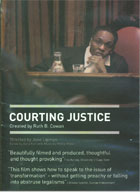
Courting Justice 2008
Distributed by Women Make Movies, 462 Broadway, New York, NY 10013; 212-925-0606
Produced by Ruth Cowan
Directed by Jane Thandi Lipman
DVD, color, 71 min.
College - Adult
Women's Studies, African Studies, Law
Date Entered: 05/15/2009
Reviewed by Miriam Conteh-Morgan, The Ohio State University Libraries, Columbus, OHThe post-majority rule constitution of the Republic of South Africa is generally described as one of the most progressive, with its emphasis on inclusiveness and broad human rights. Reforming the judicial system to enforce these new constitutional rights has been a central plank of the young democracy’s governments. Involved with these reforms are women judges, who themselves are charting new territory and re-casting the makeup of the previously white, male-dominated bench.
Viewers are introduced to some of these women in Courting Justice. They each have different social and economic histories and come from different parts of the country, but they all represent role models who have made cracks in the legal glass ceiling. In their own words, the judges share their personal stories, the challenges of their work and work environment, and how they balance these with family life. Whether it is remaining rooted to the ancestral home through frequent visits and observing traditional mediation courts, or helping the kids with piano practice, or walking the dogs, these women never lose sight of what it means to be gender, racial and legal groundbreakers.
The film is beautifully crafted. Without belaboring the point, it offers insights into South Africa’s multifaceted history, and allows viewers to feel the pulse of its urgent desire to refashion the present and future. The opening scene showing a black teacher and his multiracial students wanting to learn more about their country’s legal system cannot be a better metaphor of today’s South Africa. If I were to find one fault with this film, it is the many trivializing shots of the judges preening in their chambers. They are so much more than donning or straightening their robes; they could have shown as comfortable in robe as they seem to be in role.